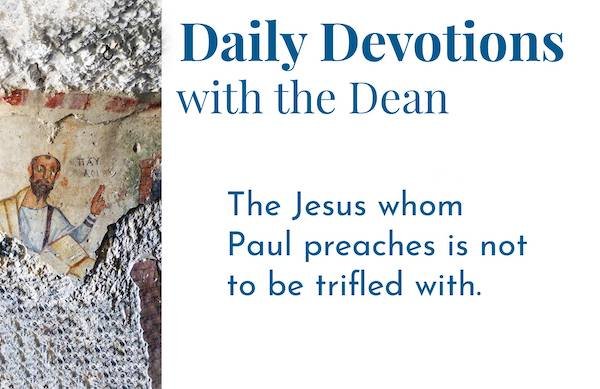Tuesday • 8/15/2023
Tuesday of the Eleventh Week After Pentecost (Proper 14)
This morning’s Scriptures are: Psalm 97; Psalm 99; Psalm 100; 2 Samuel 14:1–20; Acts 21:1–14; Mark 10:1–16
This morning’s Canticles are: following the OT reading, Canticle 13 (“A Song of Praise,” BCP, p. 90); following the Epistle reading, Canticle 18 (“A Song to the Lamb,” Revelation 4:11; 5:9–10, 13, BCP, p. 93)
Welcome to Daily Office Devotions, where every Monday through Friday we draw insights from that day’s Scripture readings, as given in the Book of Common Prayer. I’m Reggie Kidd, and I’m grateful to be with you. This Tuesday in the Season After Pentecost our readings come from Proper 14 of Year 1 in the Daily Office Lectionary.
2 Samuel 14: discerning God’s will can be hard: part one. There is a fine ambiguity in the wording of 2 Samuel 13:33. The verse can be rendered as the NRSV has it: “And the heart of King David longed to go out to Absalom; for he was comforted regarding Amnon, since he was dead.” Or it can be rendered as the notes in the New Oxford Annotated Bible suggest: “The king’s spirit for marching out against Absalom was exhausted.”
David is conflicted in his feelings for his son Absalom. The last verse of 2 Samuel 13 seems to indicate (according to the latter of the two readings above) that David’s impulse to pursue and punish Absalom for the murder of Amnon dies down after the passage of time, when David is consoled at the loss of Amnon. But, says, 2 Samuel 14:1, Absalom is still on his mind.
Joab, David’s general-in-chief, concocts a plan to convince David to reconcile with Absalom. Should David decide to exact life-for-life, the kingdom would not be well served by the loss of both Amnon and Absalom, first and second in line for the kingship. Joab secures the services of a skilled actress. She presents herself to the king as a widow survived by two sons, one of which kills the other. People have demanded she surrender the remaining son to “the avenger of blood” (2 Samuel 13:11). To do so, however, would leave her personally desolate and her estate with no heir.
Even though David sees through the ruse and detects Joab’s machinations, he grants the point. He realizes the need to extend mercy to Absalom. We’ll see in tomorrow’s reading that mercy goes only part of the way. There’s never a genuine reconciliation with Absalom, and more’s the pity.
Acts 21: discerning God’s will can be hard: part two. For a year and a half, Paul has been taking up a collection from the wealthier Gentile churches in Greece and Asia Minor to take care of the impoverished Jewish church of Jerusalem. It is his earnest hope that this symbol of Gentile-Jewish unity in Christ will help all believers appreciate the extraordinary thing that God is doing to restore wholeness to the fractured human race. He understands that there is great peril for him in his undertaking. The Jerusalem church may or may not accept the gift. Non-christian Jews in Jerusalem may conspire against him. He may run afoul of Roman authorities. Thus, from Corinth, he writes to believers in Rome on the eve of the trip to deliver the collection to the church of Jerusalem: “Now I urge you, brothers and sisters, by our Lord Jesus Christ and by the love of the Spirit, to strive together with me in your prayers to God for me, that I may be rescued from those who are disobedient in Judea, and that my service for Jerusalem may prove acceptable to the saints; so that I may come to you in joy by the will of God and relax in your company” (Romans 15:30–32).
Today’s passage narrates that trip. Paul is certain that this path is one that the Lord has laid before him. As he has already explained to the Ephesian elders, despite whatever imprisonments and punishments may lie before him, “…I do not count my life of any value to myself, if only I may finish my course and the ministry that I received from the Lord Jesus, to testify to the good news of God’s grace” (Acts 20:24). That is why he resists the well-meaning and seemingly Spirit-inspired urgings not to go to Jerusalem he encounters at two stops along his way. Sometimes, to follow God’s will you have to go against the flow.
Mark 10: discerning God’s will can be simple (if not easy). Jesus answers a question about the permissibility of divorce, and he observes people acting dismissively toward children. God brings a man and a woman together as “one flesh” for the rest of their lives, he insists. And he sets the highest priority of care on “little children.” The Lord lays before me (and I will speak personally, because all our life situations are different) two matters in which God’s will is unambiguously clear: I am to be utterly committed to my marriage, and I am to place the highest premium on the wellbeing of the little ones to whom the kingdom of God belongs. Period.
Collect for Proper 14: Grant to us, Lord, we pray, the spirit to think and do always those things that are right, that we, who cannot exist without you, may by you be enabled to live according to your will; through Jesus Christ our Lord, who lives and reigns with you and the Holy Spirit, one God, for ever and ever. Amen.
Be blessed this day,
Reggie Kidd+













